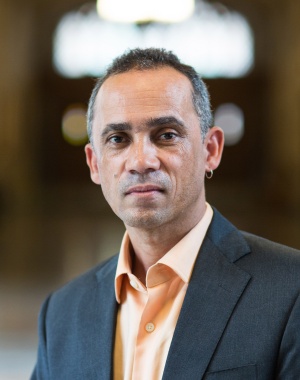Race, violence, public policy and social trauma: Restoring community in Chicago's urban context
Date & time
Location
Free and open to the public.
Join the conversation: #policytalks
About the lecture:
This lecture will explore the relationship of public policy to the impact of social trauma in communities of color in the urban context. It will discuss how oppressive social conditions and militarized and masculinized public institutions foster and may be responsible for racialized and gendered injuries in the public sphere. It will engage the concepts of ‘Spirit Injury’ and ‘Black Injury’ in contexts of rising social, public and official violence against poor, Black and Brown communities in the USA.
Dr. Harden will critically engage what he considers an attack on Black and Brown bodies by societal and institutional forces responsible for keeping the peace and building communities. His lecture will critically address discourses in the public sphere which suggest Sandra Bland, Trayvon Martin, Tamir Rice, Eric Garner, Laquan McDonald and others were “wrong” respectively for “talking back” to a police officer, wearing a hoodie, being fourteen, selling “loosies”, and simply walking publicly in a black skin. He will explain why these deadly public encounters with the state are not exceptional. Being Black in the wrong place at the wrong time is only a part of violently encountering the state every day for urban communities of color.
Dr. Harden, a member of the Mayor's Commission for a Safer Chicago, has worked for several decades to address youth violence in urban communities. He will review his work in Chicago to build institutional capacity in communities of color facing such violence and social trauma. He will share how his work in developing trauma-informed, restorative policy practices is critical in overcoming communal pain, institutional neglect, survivor narratives of guilt, self-blame and shame. He will argue why such restorative policy practices are important for communal accountability, responsibility, transformative healing and social peace.
Bios:
Dr. Troy Harden, EdD, LCSW has over 25 years experience serving and consulting in social services and community settings. Dr. Harden currently serves as the director for Northeastern Illinois University’s Master of Social Work Program, where he is also an Associate Professor. Specializing in trauma and traditional and non-traditional interventions within community settings, he has worked as a clinician, administrator, educator, intellectual, activist and community practitioner in the USA and many other parts of the world. Dr. Harden has served as a consultant with a range of institutions such as the City of Chicago, Chicago Public Schools, the Illinois Department of Human Services, and the Illinois African American Coalition for Prevention. He is currently a Co-Principal Investigator with DePaul University’s Multifaith Veterans Support Project, an initiative in the state of Illinois to build capacity in support of veteran communities and their families.
Yazier Henry is a Lecturer in Public Policy at the Ford School. He is a writer, political analyst, and professional human rights advocate. He has written and published on the political economy of memory, trauma, identity, sustainable peace, and Truth Commissions. He has in-depth experience in strategic communications, political strategy and tactics. Prior to coming to Michigan he was the founding Director of the Direct Action Centre for Peace and Memory in Cape Town, South Africa. In South Africa he worked to develop social reintegration programs with former combatants, political prisoners, and torture survivors and popular education programs focusing on sustainable peace and social dialogue. Henry has participated in, served and advised multiple community development initiatives. His research interest is in how structural and administrative violence comes to be normalized. He is especially interested in how the attainment of political rights after conflict impact civic and indigenous struggles for greater social and economic rights. Henry's current writing explores the historical and material links between political economy and race in post-colonial contexts.
